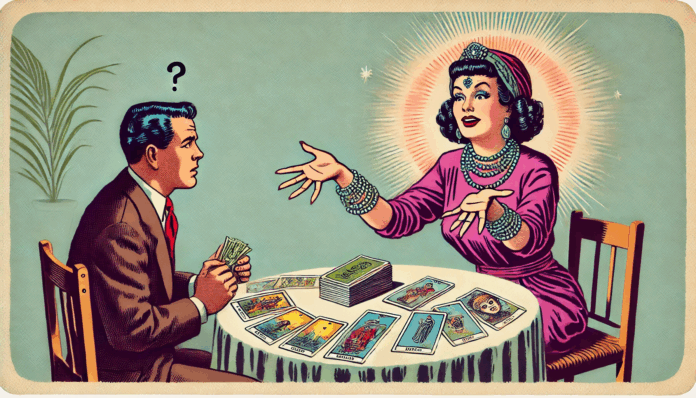New Pew Research Center Survey Sheds Light on Americans’ Beliefs
May 21, 2025 – About three in ten U.S. adults use astrology, tarot cards, or consult fortune tellers at least once a year, according to a recent survey conducted by the Pew Research Center. The findings provide a detailed look at the prevalence and motivations behind these practices in the United States.
Astrology and Psychic Services: A Growing Industry
The survey highlights the growing popularity of the psychic services industry, which includes astrology readings, tarot card sessions, and fortune-telling. While the majority of participants reported engaging with these services for entertainment, a small but notable fraction indicated that they rely on such practices when making significant life decisions.
Demographic Differences in Belief and Participation
The survey reveals notable demographic distinctions. Younger adults, particularly women aged 18 to 49, show higher engagement, with about 46% consulting astrology or horoscopes annually. The LGBTQ+ community also demonstrates significant involvement; approximately 54% consult astrology or horoscopes at least once a year, and 33% engage with tarot cards—three times the national average. Furthermore, 21% of LGBTQ+ adults report relying at least a little on insights from these practices when making major life decisions, a higher proportion than any other demographic group surveyed.
In contrast, the survey found that belief in astrology is less common among older adults, individuals with higher incomes, and political conservatives. The survey also found that Black Americans are more likely than White and Asian Americans to believe in astrology.
Religious and Non-Religious Attitudes
Religious affiliation appears to have minimal impact on these behaviors. Both religiously affiliated and unaffiliated individuals participate in these practices at comparable rates. Notably, 16% of Hispanic Catholics and 14% of Black Protestants engage in these practices primarily for helpful insights rather than just for fun. Conversely, atheists and white evangelical Protestants are among the least likely to engage in astrology, tarot, or fortune-telling.
Commercialization and Exploitation
The psychic services industry — which includes astrology, tarot readings, palmistry, and other forms of fortune-telling — has proven to be a surprisingly profitable sector in the American economy. According to data from IBISWorld, the psychic services industry generated roughly $2.3 billion in revenue in 2024, with a compound annual growth rate (CAGR) of 4.3% over the past five years. This growth has occurred despite increased public awareness of scientific literacy and critical thinking campaigns, revealing the enduring commercial appeal of pseudoscientific belief systems.
The financial viability of the industry is largely attributed to low startup costs, minimal regulation, and high consumer demand — especially among younger adults seeking “spiritual” alternatives to traditional religion. Online platforms, mobile apps, and social media influencers have lowered the barrier to entry even further, allowing virtually anyone to market themselves as a psychic or spiritual advisor and charge for services that have no basis in verifiable fact. The industry’s ability to rebrand itself as part of the “wellness” or “self-care” movement has expanded its audience and obscured its origins in superstition and magical thinking.
From a critical atheist standpoint, this profitability is troubling. It reflects not just a widespread lack of scientific understanding, but also a willingness to commodify human vulnerability — particularly during moments of uncertainty, grief, or personal crisis. The billions generated by this industry are not being exchanged for evidence-based guidance or legitimate therapeutic intervention, but for unverifiable claims and emotionally manipulative performance. The psychic services sector thrives not on truth, but on consumer credulity, and its financial success is a testament to how lucrative irrational belief can be when packaged effectively for mass consumption.
Takeaways for Atheists
Despite all our advances in science, technology, and education, it remains deeply worrisome that belief in practices like astrology and fortune telling continues to thrive in modern America. For a society that sends probes to distant planets and decodes the human genome, the persistence of such pseudoscientific beliefs reveals an unsettling gap between scientific progress and public understanding of these advances in understanding the reality we live in.
This isn’t about looking down on individuals for their personal quirks or hobbies. Everyone is entitled to their own interests and cultural traditions. But when astrology is treated not as a historical curiosity or a harmless pastime, but as a legitimate source of truth or life guidance, it undermines a collective societal commitment to evidence, logic, and reason. The fact that a significant portion of younger adults—especially among socially vulnerable groups—rely on these practices for decision-making highlights how appealing pseudoscience becomes when people feel disconnected from or distrustful of traditional sources of authority and expertise.
What’s particularly troubling is that belief in astrology is often uncritically embraced in pop culture and media without even a hint of skepticism. Unlike conspiracy theories or fringe health fads, astrology is rarely challenged in mainstream spaces—it’s normalized, aestheticized, and monetized. Horoscopes are treated as quirky fun, but the deeper message they send is that the positions of celestial bodies determine one’s fate—an idea long ago discredited by science. That so many people still find this credible in the 21st century should prompt serious reflection about how well we are teaching critical thinking in our schools and communities.
For atheists and secular thinkers, the concern is not merely philosophical. Superstition, when normalized, creates space for more dangerous forms of magical thinking—ones that can impact health choices, political decisions, and public policy. While belief in astrology may seem benign compared to religious extremism, it stems from the same willingness to accept claims without evidence. A rational society can only thrive when its members are taught to distinguish reality from fantasy—and that challenge becomes harder when the fantastical is continually sold as truth.

